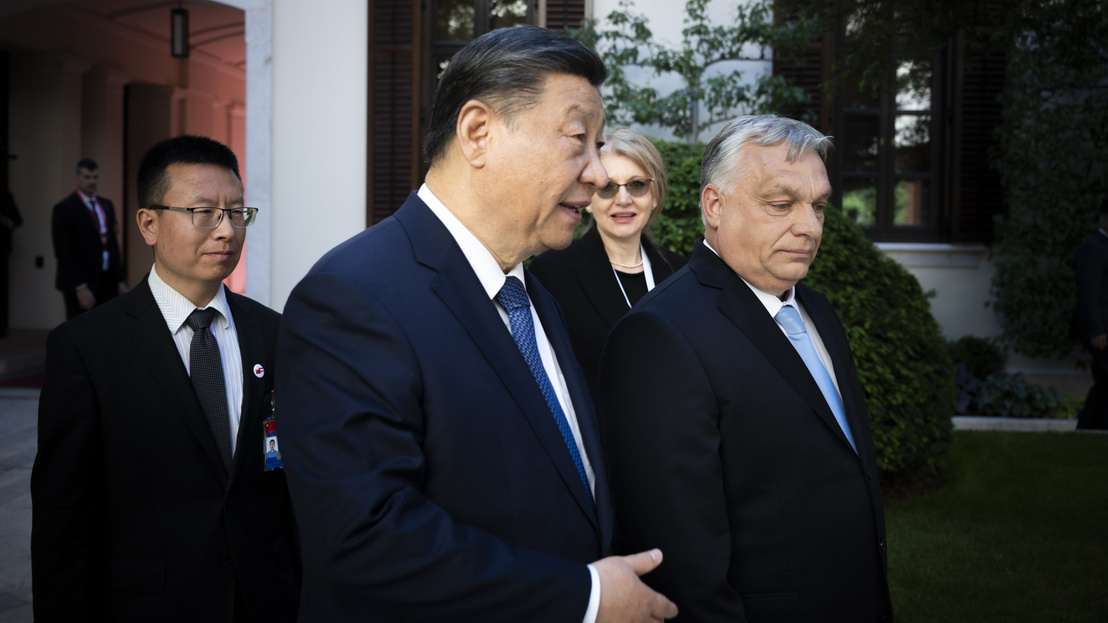You are using an out of date browser. It may not display this or other websites correctly.
You should upgrade or use an alternative browser.
You should upgrade or use an alternative browser.
China's growing geopolitical clout around the world
- Thread starter Petr
- Start date
Petr
Administrator
Hopefully all this Chinese investment will end up making Hungary economically independent from Western shitlibs (normal Europeans will always be ready to do business with them):



Shifting East: PM Orbán and Xi announce major economic agreements between Hungary and China, including massive rail projects
The Budapest Chinese-Hungarian summit ended in very successful agreements, with 18 signed, announced Hungarian Minister of Foreign Affairs and Trade Péter Szijjártó. In the framework of the Chinese Belt and Road Initiative, the Hungarian and Chinese governments have established a list of...
rmx.news
Shifting East: PM Orbán and Xi announce major economic agreements between Hungary and China, including massive rail projects
Twenty years ago, there was barely any Chinese investment in Hungary; now China accounts for three quarters of all investment in the European nation, said PM Viktor Orbán

Chinese President Xi Jinping and Hungarina Prime Minister Viktor Orbán in Budapest on May 9, 2024.
MAY 10, 2024 17:16
BY DÉNES ALBERT
The Budapest Chinese-Hungarian summit ended in very successful agreements, with 18 signed, announced Hungarian Minister of Foreign Affairs and Trade Péter Szijjártó. In the framework of the Chinese Belt and Road Initiative, the Hungarian and Chinese governments have established a list of projects to be jointly implemented, including major investments and developments.
In a speech celebrating the explosive growth in economic cooperation between China and Hungary, Hungarian Prime Minister Viktor Orbán outlined the progress made over the last decades and what is still to come.
“Ladies and gentlemen, if we compare the economic relations between the two countries to 20 years ago, we see that the value of our trade was $3 billion during the last Chinese presidential visit, and now it is $12 billion, four times as much. Then, there was only one flight between the two countries. Now seven major cities can be reached directly from Budapest. Then, the two countries spoke of friendly cooperation, friendly cooperation without any commitment other than gestures, and today our statement issued jointly with the president speaks of a strategic partnership, as they say, a fusion partnership.”
Hungary’s foreign minister, in turn, spoke about the specific economic agreements signed between the two countries during Chinese leader Xi’s landmark visit. He noted that large Chinese factories are mainly built in the east of Hungary, but the vast majority of the products are sold in the west of Europe. In order to make transport as environmentally friendly and fast as possible, new rail investment is needed, including a new major railway line that is essentially freight-oriented and bypasses Budapest. As a result, Hungary’s foreign minister announced that preparations for the construction of a rail ring bypassing Budapest will be launched in the framework of a joint Sino-Hungarian development.
Preparations will also begin for a high-speed rail link to provide fast and comfortable access from the airport to the center of Budapest. The number of air connections between China and Hungary has increased dramatically, with seven major Chinese cities now accessible from Budapest.
It has also been agreed to develop the electric car charging network in Hungary so that these vehicles can be charged as quickly as possible in as many parts of the country as possible.
Together with Serbia and Chinese partners, the construction of Europe’s most modern, largest, safest and fastest traffic management and transit crossing will be constructed between Hungary and Serbia.
They are also jointly preparing an investment to develop energy infrastructure. Hungary, Serbia and Chinese partners are exploring the possibility of the fastest possible construction of an oil pipeline between Hungary and Serbia. Agricultural exports are also expanding, allowing the export of cherry and cattle breeding material from Hungary to China.
Szijjártó described the latest announcement as a qualitatively new dimension in bilateral relations. Hungary agreed with China to prepare a cooperation program for the entire nuclear industry to ensure that the cheapest, safest and most efficient way of generating electricity can be properly applied by both countries.
“This is a historic visit, and the results are worthy of a historic visit,” concluded Szijjártó.
Orbán also noted the tremendous growth in Chinese investment over the years.
“Twenty years ago, you couldn’t find Chinese investment in Hungary with a magnifying glass at most. And today, I say that last year, three-quarters of all investment in Hungary came from China, and at the moment there is HUF 6.4 trillion (€16.4 billion) of Chinese investment in Hungary,” he said.
